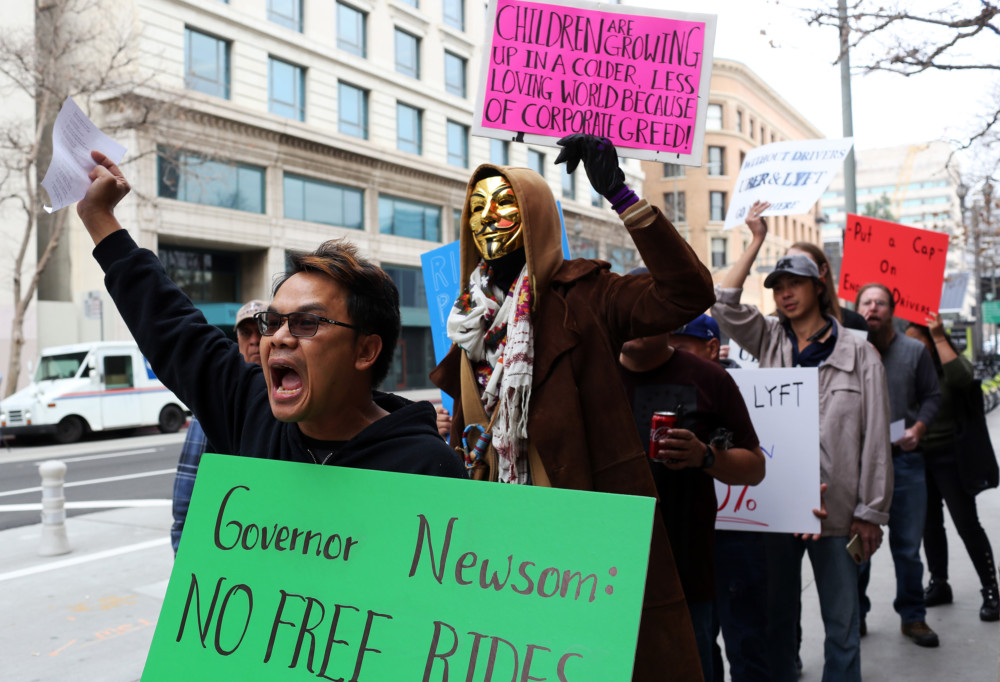By Sophia Bollag
The Sacramento Bee
WWR Article Summary (tl;dr) While the Governor of California signed the bill meant to better protect gig workers, companies like Uber, Lyft and delivery service DoorDash are saying not so fast! Sophia Bollag explains.
SACRAMENTO, Calif.
California Gov. Gavin Newsom signed a bill Wednesday that could reframe the state’s economy by compelling industries to give employment benefits to more workers.
Assembly Bill 5 was shaped by concerns that gig economy giants like Uber and Lyft have exploited workers, but it would affect many other industries as well.
Here’s a look at what the bill would mean for California workers and consumers.
WHAT HAPPENS TO WORKERS?
Following a California Supreme Court decision last year, more California workers are entitled to benefits and protections, such as compensation for injuries sustained because of their work, sick leave and minimum wage.
Unions, which have been the top supporters of the bill, say the change is a dramatic improvement for many workers, guaranteeing fair wages and treatment.
Businesses ranging from technology companies to health care providers argue they will struggle to sustain their existing business models under the new rules.
Ride-hailing company Lyft says it might have to employ as many as 300,000 fewer drivers if it must re-classify them as employees. It also says it may have to limit drivers’ ability to set their own schedules by limiting hours or setting shifts.
Meanwhile, ride-share competitor Uber argues the rules won’t affect its drivers, whom it will continue to classify as independent contractors.
AB 5 will take effect January 1, but it’s unclear when many workers may be reclassified, especially given the likelihood of future litigation.
WHO IS EXEMPT FROM THE NEW RULES UNDER AB 5?
Lawmakers granted carve-outs to some professions under the legislation, many of which lobbied for a reprieve from the new rules.
The bill’s author, Assemblywoman Lorena Gonzalez, D-San Diego, said she and her colleagues chose to exempt industries based on how much workers are paid, whether they operate with autonomy and how much power they have to negotiate with their employers.
Dozens of professions are exempt from the new rules under the bill, including insurance brokers, doctors, lawyers, architects, engineers, veterinarians, accountants, fishermen, real estate agents, cosmetologists, and others. Freelance journalists who do fewer than 35 assignments for a single publication in a year are also exempt. News organizations won a one-year reprieve from treating their paper carriers as employees.
WHAT WILL AB 5 MEAN FOR CONSUMERS?
Some companies argue they will be forced cut back on services or raise prices, although labor groups have disputed those arguments.
For example, Lyft says if it isn’t given a reprieve from the new rules it may leave some parts of California. The company also says costs and wait times for rides could increase.
Many other industries would also be affected. Groups representing therapists and counselors argue they should be exempt, just like psychologists are under the bill. They say many of the workers they represent want to remain independent contractors and that the new rules will disrupt their businesses, reducing access to services and driving up costs.
WHAT PROMPTED AB 5?
AB 5 makes a 2018 California Supreme Court decision called “Dynamex” part of state law. Justices ruled that a worker should be classified as an employee and entitled to corresponding benefits unless they meet the requirements under a three-part test:
The worker is free from the employer’s direction and control while performing their job
Their work falls outside the scope of the employer’s usual business
The worker typically performs the same type of work as an independent entity
Although employers in California must already follow the guidelines under the decision, AB 5 aims to clarify how the ruling should be carried out in practice. Without it, the exempt professions would generally be subject to the new rules under the Supreme Court decision.
IS THERE STILL A CHANCE FOR MORE EXEMPTIONS?
Many interest groups are still pushing for additional professions to be excluded from the new worker classification rules, including the therapist groups.
But any additional exemptions would likely have to wait until next year when lawmakers return from their fall break. Some lawmakers who voted for AB 5 acknowledged that they will need to continue negotiating with various industries and professions next year.
In the meantime, gig-economy companies Uber, Lyft and delivery service DoorDash have pledged to spend a combined $90 million to take the issue to voters if they don’t reach a deal with California lawmakers to explicitly allow them to continue treating their workers as contractors.
That’s a formidable sum, even in the world of California ballot measures, where interest groups often spend millions and aren’t subject to contribution limits.
___
Distributed by Tribune Content Agency, LLC.














































































































































































































































































































































































